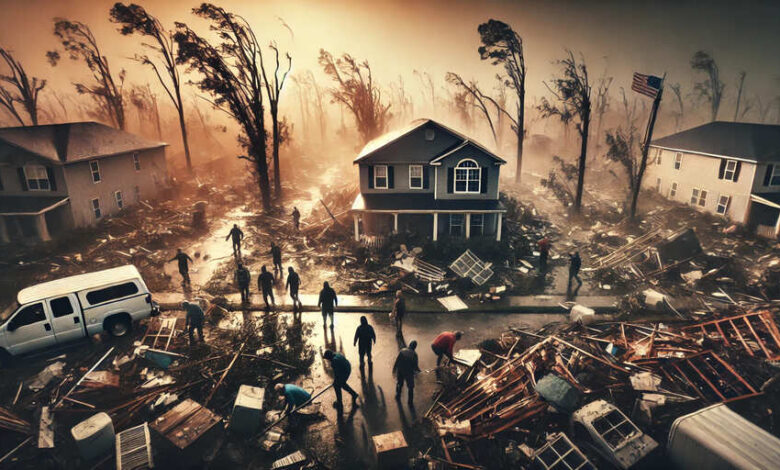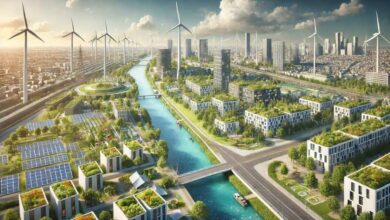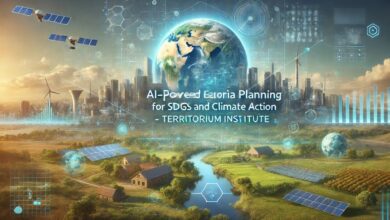Hurricanes and Climate Action Topical Authority for Citizens-SDGIEVER

- Cluster Structure for Local Governments: Climate Action and COP29
- Cluster 1: Climate Change and Local Governments – A Call to Action
- Cluster 2: Disaster Preparedness and Resilience for Local Communities
- Cluster 3: Sustainable Urban Planning and Climate-Resilient Infrastructure
- Cluster 4: Local Climate Mitigation Strategies
- Cluster 5: Financing Climate Action at the Local Level
- Cluster 6: Engaging Citizens and Businesses in Local Climate Action
- Cluster 7: Measuring and Reporting Progress
- Cluster 8: Lessons from COP29 for Local Governments
- Cluster 9: Future-Proofing Cities for Climate Change
- Cluster 10: Policy and Legal Frameworks for Local Climate Action
The devastating impacts of hurricanes like Helene and Milton, coupled with the global momentum leading into COP29, create a timely and crucial context for local governments to enhance their climate action and disaster preparedness efforts. SDG 13 (Climate Action) and SDG 11 (Sustainable Cities and Communities) are directly tied to these challenges, and local governments are on the frontline of climate adaptation, disaster risk management, and sustainable development. This is an excellent opportunity to build topical authority for local governments on these themes.
Here’s a cluster structure that can be used to develop articles and other knowledge products tailored for local governments, focusing on climate change, disaster preparedness, and the upcoming COP29.
Cluster Structure for Local Governments: Climate Action and COP29
This cluster will focus on empowering local governments with actionable insights and strategies to mitigate climate risks, enhance disaster preparedness, and contribute to the global climate agenda.
Cluster 1: Climate Change and Local Governments – A Call to Action
This cluster sets the foundation for why local governments play a critical role in addressing climate change and what COP29 means for them.
- Why Local Governments are Key Players in the Fight Against Climate Change
- How Hurricanes Helene and Milton Highlight the Need for Local Climate Action
- The Role of COP29 in Driving Climate Policy: What Local Governments Need to Know
- Climate Change and the Built Environment: How Local Governments Can Respond
- Why Climate Adaptation Must be a Local Priority in the Face of Superstorms
- The Growing Cost of Inaction: What Helene and Milton Teach Us About Resilience
- How Local Climate Action Can Align with National and Global SDG Targets
- Engaging Citizens in Climate Resilience: How Local Governments Can Lead
- Bridging the Gap Between Local Governments and Global Climate Agreements
- Preparing for COP29: What Local Governments Can Contribute to the Global Climate Agenda
Cluster 2: Disaster Preparedness and Resilience for Local Communities
This cluster focuses on practical strategies for local governments to improve disaster resilience and preparedness.
- Building Resilient Communities: Lessons from Hurricanes Helene and Milton
- How to Create a Comprehensive Disaster Preparedness Plan for Your Municipality
- Strengthening Local Infrastructure Against Extreme Weather Events
- The Role of Green Infrastructure in Building Resilient Cities
- How to Create Effective Early Warning Systems for Extreme Weather Events
- Flood-Resilient Cities: Best Practices for Local Governments
- Emergency Management for Local Governments: From Planning to Response
- How to Support Vulnerable Populations During Disasters
- Lessons from Hurricane Recovery: Rebuilding Smarter and Greener
- Disaster Risk Reduction: How to Involve Local Communities in Resilience Efforts
Cluster 3: Sustainable Urban Planning and Climate-Resilient Infrastructure
Articles focusing on how local governments can implement climate-resilient urban planning and infrastructure projects.
- How Local Governments Can Build Climate-Resilient Cities
- Integrating Climate Risks into Urban Planning: Best Practices for Local Authorities
- The Role of Public Spaces in Climate-Resilient Urban Design
- How to Retrofit Existing Infrastructure for Climate Resilience
- Building Back Better: Sustainable Approaches to Post-Disaster Reconstruction
- Climate-Resilient Housing: What Local Governments Can Do to Protect Communities
- Incorporating Nature-Based Solutions into Urban Infrastructure Plans
- How Coastal Cities Can Prepare for Rising Sea Levels
- Public-Private Partnerships for Climate-Resilient Infrastructure Development
- The Importance of Zoning and Land-Use Policies in Reducing Climate Vulnerabilities
Cluster 4: Local Climate Mitigation Strategies
This cluster focuses on mitigation strategies that local governments can implement to reduce greenhouse gas emissions and promote sustainability.
- Reducing Local Carbon Emissions: Practical Strategies for Cities
- How Municipalities Can Lead the Charge on Renewable Energy
- The Role of Public Transport in Cutting Local Emissions
- Energy Efficiency in Municipal Buildings: A Roadmap for Local Governments
- How to Implement a City-Wide Climate Action Plan
- Sustainable Waste Management Practices for Local Governments
- Reducing Emissions in Local Industry: What Municipalities Can Do
- Climate Mitigation Through Local Policy: Tools for Success
- How Local Governments Can Support Community-Led Renewable Energy Projects
- Local Agriculture and Urban Farming: Strategies for Reducing the Food Carbon Footprint
Cluster 5: Financing Climate Action at the Local Level
Funding is always a challenge for local governments. This cluster explores various ways to finance climate action and disaster resilience.
- How Local Governments Can Access Climate Finance
- Funding Disaster Preparedness: Grants, Loans, and Private Sector Partnerships
- Public-Private Financing for Climate Resilience: What Local Governments Need to Know
- How to Apply for International Climate Funds: A Guide for Municipalities
- Local Green Bonds: Financing Sustainable Urban Infrastructure
- How to Budget for Climate Action at the Municipal Level
- Unlocking Local Investment in Renewable Energy Projects
- Climate Adaptation Grants for Cities: How to Navigate the Funding Landscape
- Innovative Financing Models for Resilient Infrastructure
- Collaborating with National Governments to Secure Climate Funding for Local Projects
Cluster 6: Engaging Citizens and Businesses in Local Climate Action
This cluster focuses on how local governments can engage citizens, businesses, and civil society to drive climate action.
- How to Involve Citizens in Local Climate Action Plans
- Building Climate Awareness in Your Community: Best Practices for Local Governments
- How to Encourage Climate-Friendly Business Practices in Your Municipality
- Public Participation in Climate Action: Models for Success
- Engaging Local Businesses in Climate Resilience and Sustainability Initiatives
- How Local Governments Can Foster Green Jobs and Sustainable Businesses
- Empowering Youth in Climate Action: Local Government Strategies
- How to Launch a Local Climate Education Campaign
- The Role of Public Consultations in Creating Effective Climate Policies
- Collaborating with NGOs and Civil Society to Drive Climate Action at the Local Level
Cluster 7: Measuring and Reporting Progress
To build credibility and demonstrate impact, local governments need to measure and report their climate action progress.
- How to Measure the Impact of Your Local Climate Action Plan
- Tools for Tracking Municipal Greenhouse Gas Emissions
- Reporting on Climate Action: Best Practices for Local Governments
- How to Use Data to Drive Local Climate Policy Decisions
- The Importance of Monitoring and Evaluation in Climate Resilience Projects
- How to Align Local Climate Reporting with Global Standards (e.g., UNFCCC, IPCC)
- The Role of Transparency in Local Climate Governance
- How to Create Climate Action Dashboards for Your City
- Community-Led Climate Data Collection: Engaging Citizens in Tracking Progress
- Showcasing Local Climate Success Stories: Building a Positive Narrative
Cluster 8: Lessons from COP29 for Local Governments
COP29 will generate a wealth of knowledge and agreements that local governments can adopt. This cluster will focus on translating these global decisions into local action.
- What Local Governments Can Expect from COP29
- Key Climate Agreements from COP29 and How They Affect Local Governments
- How to Align Your Municipal Climate Policy with COP29 Outcomes
- The Role of Local Governments in Achieving COP29 Climate Goals
- How COP29 Strengthens the Case for Local Climate Action
- Leveraging COP29 Momentum for Local Climate Initiatives
- Translating COP29 Commitments into Local Climate Policy
- How Local Governments Can Engage with National Delegations at COP29
- The Role of Local Governments in International Climate Diplomacy Post-COP29
- How to Build Partnerships for Climate Action Following COP29
Cluster 9: Future-Proofing Cities for Climate Change
Looking ahead, local governments must build future-ready cities that can withstand the challenges posed by climate change.
- How to Future-Proof Your City Against Climate Risks
- Building Smart, Resilient Cities: The Role of Technology in Climate Adaptation
- How Local Governments Can Address Climate-Induced Migration
- Planning for the Future: Climate Risk Assessments for Local Governments
- Creating a Vision for a Climate-Resilient City by 2050
- Adapting Municipal Policies for a Changing Climate
- How to Create a Climate Resilience Task Force in Your City
- Climate-Proofing Critical Infrastructure: Lessons from Around the World
- The Role of Innovation in Building Climate-Resilient Communities
- Preparing for Climate Change: Lessons from Cities on the Frontline
Cluster 10: Policy and Legal Frameworks for Local Climate Action
Local governments need strong policy and legal frameworks to implement climate actions effectively.
- How to Draft Effective Local Climate Policies
- Integrating Climate Action into Existing Municipal Policies
- The Role of Local Governments in Implementing National Climate Laws
- How to Create a Legal Framework for Climate Resilience
- Zoning and Land Use Laws for Climate Risk Reduction
- How Local Governments Can Push for Stronger Climate Legislation
- Collaborating with State and National Governments on Climate Policy
- Using Local Laws to Foster Green Building and Energy Efficiency
- The Role of Climate Courts in Holding Local Governments Accountable
- How to Implement Sustainable Procurement Policies at the Local Level
This tailored cluster structure is designed to position local governments as key actors in the fight against climate change, aligning their actions with SDG 13 and the global priorities highlighted at COP29. These articles will empower local authorities with the knowledge, tools




